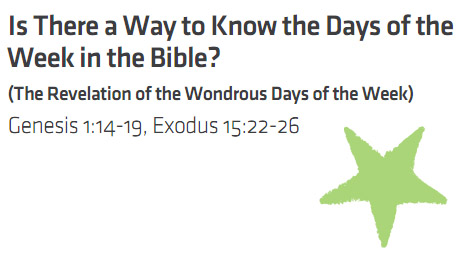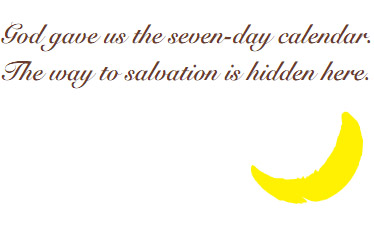|
Is There a Way to Know the Days of the Week in the Bible?
|
|
|
글쓴이 :
관리자
|
|

God is the master and creator of history. He leads the history of redemption (the history He administered by paying the price to save humankind) as well as the history of the world (world history). The sixty-six books of the Old and New Testaments are records that show how God led the history of the world and the history of redemption. Therefore, the his-tory of redemption is not only history that deals with Christianity, but it is at the center of world history.
The entire redemptive history is not a made-up story or a legend but a historical account that precisely dates even to the exact year, month, day, and hour. It is written this way, from the creation to the second coming of Jesus Christ. On the fourth day of creation, the Bible says, “Let them be for signs and for seasons and for days and years,” which refer to year, month, day, and hour (Genesis 1:14). Thus, all the events after the creation of Adam have the year, month, day, and hour in accordance with their occurrence.
The second coming of Jesus will be the same. Jesus has said that He is surely returning. If one’s own father is coming back from a journey, who could possibly not ask at what time he is coming (Matthew 24:36, 50)? The believers of this end time awaiting His second coming should prepare by being clothed in order not to show their shamefulness. To do so, one must read the Bible. Only through the Word of God and prayer can one become holy (1 Timothy 4:4-5).
Time is controlled by the calendar
People live according to the calendar, through which they become aware of time and space.
Success in life depends on how successfully people spend their time. God’s calendar con-tinues to the present; there has not been even one second of a mistake since the time of creation. God gives His calendar to man so that he will live purely without sin. Further-more, it is given to prepare for the final days and the time of His coming. The calendar lets us know the spring, summer, fall, and winter seasons. Through the signs of the sun, moon, and stars (Luke 21:25), we can look at the calendar and realize God’s providence, enabling us to prepare for the Lord’s return. Thus, the calendar given by God is a never-changing covenant or contract ( Jeremiah 33:20). Contract is “b?riyth” in Hebrew, a covenant that means “giving a blessing.”
There is something in God’s calendar that we must pay attention to. It is “the days of the week.” The year, month, day, and hour are decided by the movements of the sun, moon, and stars. The earth completes its rotation on its axis in a day, the moon completes its orbit in a month, and the earth completes its orbit in a year (Psalm 136:7-9). However, despite the unit of seven days, the “days of the week” are not affected by the sun, moon, and stars. God’s special message is contained here. In the Bible, each day of the week is not given a name;
they are only written as ordinal numbers (the first day, the seventh day, etc.). The seventh day is the day of the Sabbath. God’s providence always works around the day of the Sab-bath. Thus, in the last days, those who keep the day of the Sabbath will prevail. In the Bible, the number “seven” is the number of perfection; it represents the addition of the number of Heaven (Father, Son, and the Holy Spirit) and the number of Earth (North, South, East, and West). It is a number that tells of God’s perfect and unchanging nature.

Reasons for giving us a calendar with seven-day weeks
The Israelites departed from Egypt on January 15, 1446 BC (Exodus 16:1-36). On Febru-ary 16, God gave manna to the people of Israel for the first time. This continued for the next six days. Each day, they were to gather a day’s portion, and they had to rise early in the morning to do so. However, there were those who complained, saying, “Why doesn’t He give it to us all at once? Why do we have to rise early each morning, which takes us away from our sleep?” Children are unhappy when they don’t know their parents’ intentions, but here lay God’s providence. The manna came down every day, but on the sixth day (February 21), it fell twice as much. On the seventh day (February 22), the manna did not come down.
It was because the seventh day was the Sabbath. The people of Israel completely forgot about the Sabbath day during the 430 years of slavery in Egypt. God made sure that His people knew the Sabbath and kept it through the manna.
Since the manna came down on February 22, 1446 BC, we can know that this was a Sat-urday. (The concept of the days of the week begins from six o’clock in the afternoon. Using today’s calendar, a full Friday is from six o’clock on Friday afternoon to six o’clock on Sat-urday afternoon, which is the Sabbath day.) Based on this date and by adding numbers, we can find out all the days of the week for the events that took place in the Bible. For example, after departing from Egypt, the Israelites experienced the miracle of the Red Sea, and after a three-day journey (Exodus 15:22), they arrived at Marah on Saturday, January 24.
The historical event that took place
God taught the Israelites two commandments: to keep the Sabbath day and to love one’s parents. Until then, the Israelites had followed the Egyptian calendar that used the ten-day week, and had forgotten the calendar of the Sabbath day that used the seven-day week.
They lost the Sabbath day for 430 years during their slavery in Egypt. To them, God gave “keeping the Sabbath day” and “loving one’s parents” as the fourth and fifth command-ments of the Ten Commandments. This happened forty days before God gave them the Ten Commandments. God gave the Ten Commandments to the Israelites in the Wilder-ness of Sinai on March 6, 1446 BC, in Marah. The fourth and fifth commandments were given first on Saturday, January 24, on the day of the Sabbath.
Regarding the two commandments that were first given to the people in Marah, the Bible states: “There He made for them a statute and regulation” (Exodus 15:25). In Hebrew, both are written in the singular form; thus, they can be translated as “a statute” and “a regulation” (the KJV English Bible translates them as “a statute” and “an ordinance”).
“A statute” is choq in Hebrew, and it is used as a commandment regarding God. It is one of the commandments that explain our relationship with God. “An ordinance” is mishpat in Hebrew, and it is a commandment regarding people. It is one of the commandments that explain our relationship with people. The commandments “a statute” (regarding God) and “an ordinance” (regarding people) mean “keeping the Sabbath day” and “loving one’s parents” respectively, and they can be found in the book of Deuteronomy. The book of Deuteronomy records the event of God giving the Ten Commandments, and only the fourth commandment (keeping the Sabbath day) and the fifth commandment (loving one’s parents) are spoken with the condition, “as the LORD your God commanded you” (Deuteronomy 5:12, 16). In the original Hebrew, “as the Lord your God commanded you” is in the past tense. (The KJV English Bible translates it thusly: “as the Lord your God has commanded.”) In other words, the fourth and fifth commandments had already been commanded before the Ten Commandments were given to them.

Why did God give them these two commandments first?
It was done in order to give the basic frame of the Ten Commandments ahead of time. The fourth and fifth commandments are representative of all the other commandments. They are the core of the Ten Commandments. They may not seem related under careless obser-vation, but they always go as a matching pair, just like a couple or twins. They are the most basic commandments. Parents are God on this earth (Leviticus 19:3). God taught the most basic commandments in Marah and tested the people of Israel to see if they would keep the Sabbath day (Exodus 15:25). During their week-long stay at Marah, the people kept the Sabbath day for the first time on Saturday, February 1.
The Sabbath day is an eternal sign and covenant. The generations that did not keep the Sabbath were entirely omitted from Jesus Christ’s genealogy. The 430 years of slavery in Egypt and the 340 years of the period of the Judges are prime examples (for more detailed information regarding the omitted periods in Jesus’ genealogy, refer to the Redemptive Series). Keeping the Sabbath day pleases God the most. It is because the Sabbath is not only about remembering God’s six-day creation and His rest on the seventh day, but it also symbolizes the eternal Sabbath, God’s kingdom, which the saved ones will enter. God commanded us to keep the Sabbath, and through such practice, He wants us to desire the true Sabbath and to anticipate the day when we will enter it. The Sabbath is the practice of spiritual intake and the discontinuance of physical intake. It is the shadow of entering the eternal world.
Thus, God has a lot of interest in the seven-day calendar and intervenes actively in “the days of the week.” Since the creation, God has never forgotten the history of the seven-day weeks. God planted this into us as well. When we keep the Sabbath as God wants us to, we can see that nothing happens against our will. The fight to keep the Sabbath is the fight against the seven Canaanite tribes and the fight against my seven sinful natures (Matthew 15:19). We should come to church more, greet God, and receive His grace, especially at times when we are experiencing troubles and weariness.
God’s history of redemption continues to run
God’s history of redemption is running to those who have not yet realized God’s love.
Those who have ignored God’s calendar, living their lives as they wished, must repent. God knows where we are headed and what we are thinking, and He knows our hearts have not given the best to Him. The glories of the sun, moon and stars are different. God rewards them accordingly. The remainder of our lives must be lived within God’s calendar and not my own. My country, my church, my soul and body, and even my family ? all of these we must entrust to God.

We must repent if we have not kept the Sabbath, and have been unwilling to learn His statute and ordinance to this day. Our greed and selfishness must disappear with the help of the Word of God, just like the seven Canaanite tribes. When we begin to understand the Word of God, He takes care of our fallacies for us. We labored and have become weary from earning for a living; but if we obey the Ten Commandments, God will bless us when we go out and when we come in. When we see this, we will be regretful for ‘believing God in our own way.’ Therefore, always be thankful to God.
Sermon message given on the Lord’s Day, October 27, 2013
|
|

